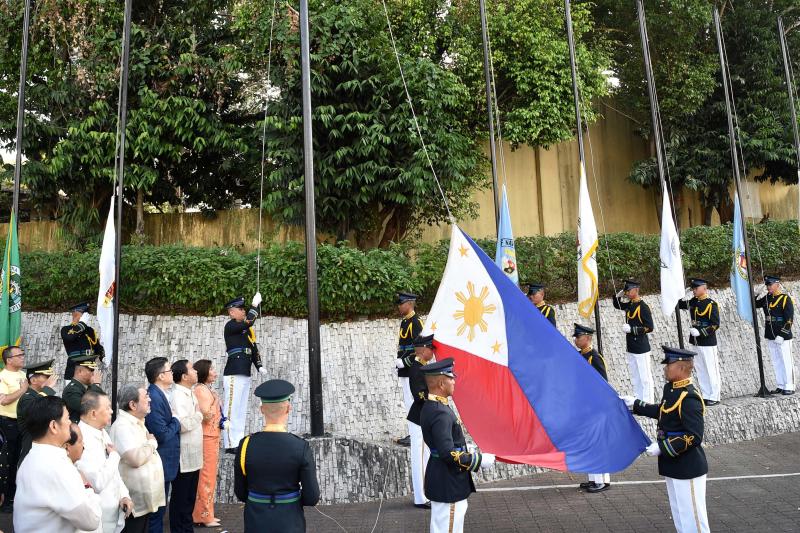For most Filipinos, 'People Power' revolt now just a distant memory
Sign up now: Get insights on Asia's fast-moving developments

Philippine military personnel prepare to raise the national flag during celebrations to commemorate the 33rd anniversary of the "People Power" movement in Manila on Feb 25, 2019.
PHOTO: AFP
MANILA - Thirty-three years is a long time to keep a legacy alive.
In the case of the popular "People Power" revolt in 1986 that ousted a brutal regime in the Philippines, the interlude has made it a cause for disappointment and a reminder of everything that has gone wrong in the country since then.
For those still clinging to it, the memory of the revolution needs to be invoked now more than ever to rein in an atypical leader's autocratic tendencies.
For those who would rather forget it, "People Power" is a ghost that the government's loudest critics are using to return to power.
On Feb 22, 1986, the Philippines teetered on the brink of civil war after the defence minister and head of the national police mutinied against the dictator Ferdinand Marcos and, with elite units loyal to them, seized Manila's two largest military camps along Edsa, the main highway that cuts across metropolitan Manila.
For four days, the two sides wrestled to win over the military. What tipped the scale was a massive outpouring of civilians who, at great risk to their lives, poured onto the streets and surrounded the mutineers inside their camps, holding back armoured columns sent to quash the rebellion with flowers and rosaries.
By the end of that standoff, on Feb 25, Mr Marcos and his family were in a US military plane on their way to exile in Hawaii.
In the years that followed, that victory over a dictator was cause for grand celebrations. Major roads were closed to give way to three days of rallies, parades, concerts, speeches and re-enactments.
In recent years, however, the mood has radically shifted, as the revolution failed to deliver on its grand promise of peace, freedom and prosperity for all.
Income inequality is wider now than it has ever been before. More than 26 million Filipinos are still languishing below the poverty line, and corruption continues to fester in the bureaucracy like cancer cells.
Popular opinion now is that only the very wealthy reaped the fruits of the 1986 revolution.
"Gone is the celebratory spirit. Today, there is hardly any expression of public recognition of the significance of those historic days," said Mr Randy David, a political commentator and professor at the University of the Philippines.
The frustration and resentment over the failed lofty promises of the revolution has made a thin herd of the multitude that used to see so much hope in it.
In February 1986, over two million people flooded Edsa to protect their revolution. On Monday (Feb 25), less than 2,000 turned up at the People Power monument.
Still, these stragglers are drumming up the memory of People Power as they try to roll back a revisionist tide that is recasting Marcos as a victim rather than perpetrator of unspeakable crimes, a script that has gained even more currency under President Rodrigo Duterte, who has anchored his political fate to an alliance with the late strongman's children.
Most of his critics see Mr Duterte as the final repudiation of the Power Power revolt, and a catalyst to a slide back into authoritarian rule.
Civil rights activists have criticised him for the over 5,000 suspects killed in his brutal war on the narcotics trade, and his relentless attacks on media organisations that have cast a magnifying glass on this crackdown.
They see his declaration of martial law over Mindanao, the country's third-largest island, as an experiment in iron-fisted rule.
"It seems we're going back to the ways of the regime we fought in the dark days of martial law. Now, it seems we are taking a detour," said former president Benigno Aquino, whose family was at the forefront of the anti-Marcos movement. In fact, it was the assassination of Mr Aquino's father that eventually led to the 1986 revolt.
Former solicitor-general Florin Hilbay, who is running for senator under the opposition's slate, said "these are very dark and challenging times".
But for another candidate for senator, Mr Sergio Osmena, who spent five years in jail for opposing Marcos in the 1970s, Mr Duterte "is going to leave after he's through".
"He just wants to finish what he said he would do which is wipe out drugs in this country, if possible, wipe out corruption," he said.
For Mr David, the analyst, People Power will remain a pivotal point in the country's history. But it "has passed on," he said.
"The sooner we recognise this, perhaps the easier it would be to understand - and hopefully move on - from where we are today," he said.


